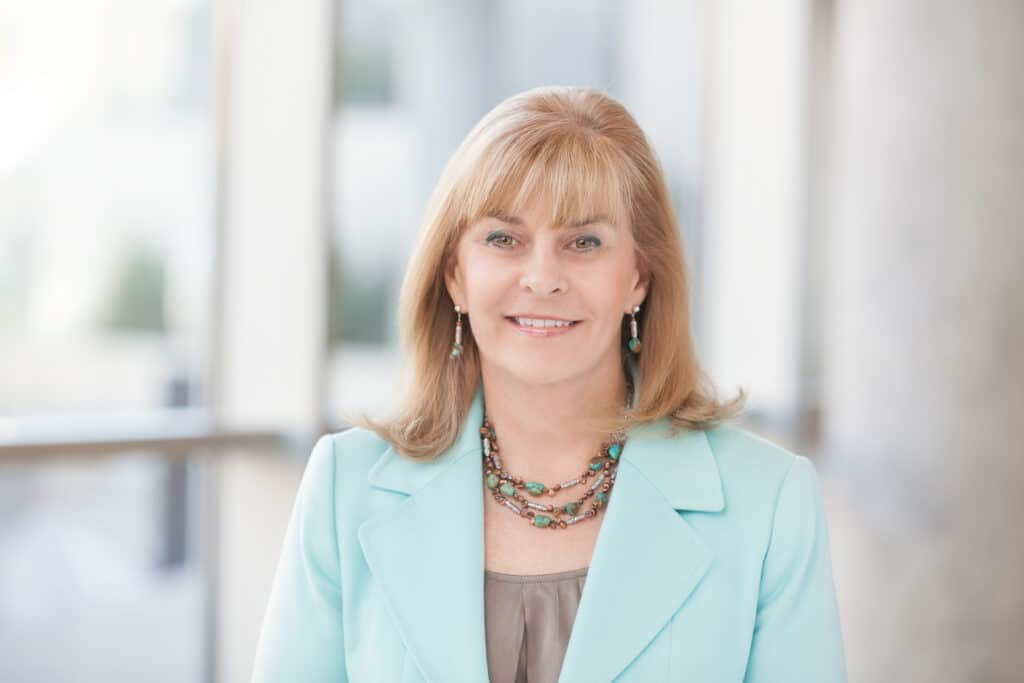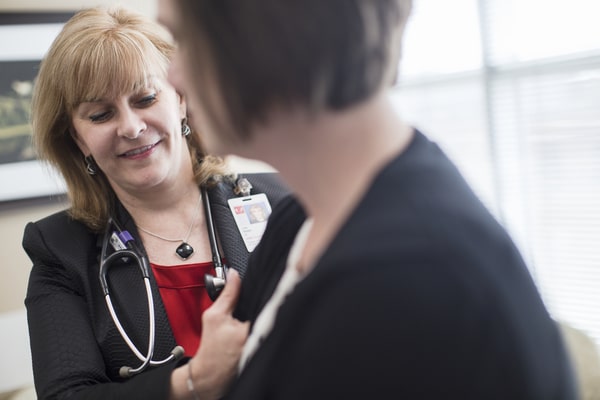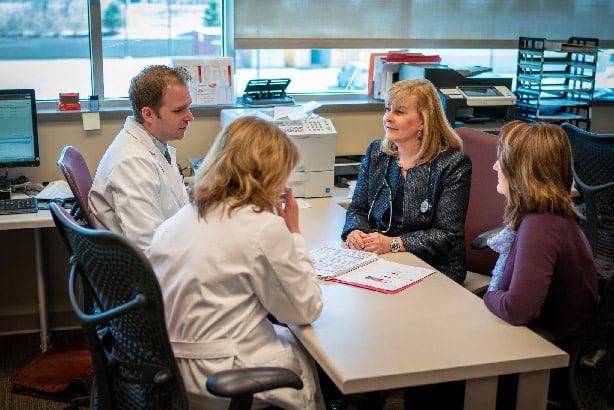Leading the Path to a Cure Through Research

Born and raised in Mitchell, South Dakota, Julie M. Vose, MD, MBA, grew up in a medical family. Her father was a pathologist, and her mother was a nurse, so the goal of one day becoming a doctor was influenced by her day-to-day experience. After graduating college with a degree in medical technology, Dr. Vose decided to follow in her father’s footsteps and attended medical school at the University of Nebraska Medical Center (UNMC) in Omaha. While she initially thought she might want to be a pathologist like her father, she decided
instead to go into internal medicine, and then later, oncology and hematology.
“My dad gave me the opportunity to work in his lab in high school and college, and I found myself fascinated with blood cells and cancer cells,” explained Dr. Vose. “While in medical school, I grew very interested in lymphomas specifically, thanks to the research of one of my mentors. I’ve been very fortunate to have had great mentors in my life who have guided me into medicine and research, starting with my father, and throughout my early steps into the field.”
Today, Dr. Vose is an oncology and hematology physician and the chief of the Division of Oncology and Hematology at her alma mater, where her research centers on treating patients with lymphoma and chronic
lymphocytic leukemia (CLL). She has also had a clinical focus on chemotherapy, immunotherapy, cellular therapy, and pathway-directed agents for treatment and clinical trial research. In her limited spare time, she enjoys painting in watercolor and acrylics and the occasional pickleball match.
One of the aspects that drew Dr. Vose to the field early on was witnessing the remarkable recoveries of patients with lymphoma who responded well to treatment.
“Every year, we conduct new research and make new discoveries that expand our knowledge of lymphoma,” said Dr. Vose. “Many patients with lymphoma are curable or very treatable and it’s gratifying to see the work we’ve poured into research make a meaningful difference in the patients’ lives. The fact there are so many success stories in treating lymphoma makes our research even more rewarding.”
The Power of Clinical Trials

A past president of the American Society of Clinical Oncology and a former member of the LRF Scientific Advisory Board (SAB), Dr. Vose is actively involved in large-scale clinical research with large retrospective databases at the University of Nebraska lymphoma study group and genomic analysis associated with those specimens and patient information. In addition, she’s involved in clinical trials with novel therapies, including oral agents, pathway-directed agents, monoclonal antibodies, and most recently, CAR-T cells.
“Research into novel therapies is important because lymphoma is very heterogeneous with many different types and subtypes, which means no one treatment is going to be successful in treating all of them,” said Dr. Vose. “We need to develop multiple treatments that attack the lymphoma from different angles and potentially work together. I’ve enjoyed working on the clinical trials of treatments that have gained Food and Drug Administration (FDA) approval and have gone on to help a specific patient population.”
FDA approvals of novel therapies for lymphomas can take eight to ten years or longer, which creates a unique set of challenges, but Dr. Vose remains undeterred, finding encouragement among her colleagues with a shared common focus.
“Clinical trials are always difficult because there’s the funding element and all that patients have to go through, in addition to the regulatory requirements, and in some cases, potential side effects from the medicine,” explained Dr. Vose. “It takes an army of researchers to conduct clinical trials in multiple institutions and to be able to collect and evaluate the data for potential submission to the FDA.”
Some of those clinical trials are yielding promising results.
“In the last few years, some of the most interesting developments have been the development of CAR-T cells and the continued expansion of those to treat different types of lymphomas, as well as potential combination treatments,” said Dr. Vose. “And then even more recently, there’s been some promising work with bi-specific antibodies, and their potential development for use with different types of lymphomas. I’m also encouraged by newer therapies, such as pathway-directed agents that are being developed and are showing promise in treating some of the slower growing types of lymphoma.”
When it comes to what lymphoma/ CLL patients can do to contribute to scientific research, Dr. Vose encourages patient participation in clinical trials and for patients to make their personal information accessible for large lymphoma databases that look at outcomes for patient populations with specific types of lymphomas. According to Dr. Vose, the clinical trials today are the building blocks to developing the new drugs and new treatments that will treat the patients of tomorrow.
“The only way to increase our knowledge and to enhance lymphoma research is by conducting these clinical trials and that’s why the funding of research and clinical trials is so important,” she said. “Anyone interested in participating in a clinical trial should reach out to their oncologist, who may be able to help direct them to specific clinical trials in process. Organizations like LRF provide key information and resources to help connect patients with clinical trials as well.”
Supporting the Lymphoma Community
Dr. Vose first got involved with LRF many years ago and has seen the Foundation grow into the nationwide organization it is today, helping thousands of lymphoma patients with education, grants, and resources. Before the pandemic, Dr. Vose was an active participant in past LRF walks, which took place every spring in Nebraska, to raise money for lymphoma research and to increase community awareness of lymphoma and the needs of lymphoma patients and their families.

“LRF has been instrumental in supporting important lymphoma research in clinical trials and provides lymphoma patients with valuable, trusted information and the emotional support and community they may need during treatment.”
Equally important, according to Dr. Vose, is the support and resources that LRF provides to caregivers, who are involved day-to-day with their loved one’s treatment plan.
“I strongly recommend that patients have a caregiver or family member come with them to their appointments,” said Dr. Vose. “There’s a lot of detailed information to take in and four ears are better than two. Caregivers are also instrumental in carrying out treatment instructions and in providing necessary moral and physical support throughout the treatment process.”
Promising Developments for the Future
Having been in the field for over 30 years, Dr. Vose is encouraged by the continued progress in understanding how various types of lymphomas operate. She continues to be motivated by the goal of eventually eradicating lymphoma.
“We keep learning more and more about the biology behind different types of lymphoma, which enables us to choose specific therapies based on that biology,” said Dr. Vose. “And on a day-to-day basis, the fact that we are able to cure many of our patients, or at least put them into remission for very long periods of time, is personally gratifying. I have patients whom I treated over 30 years ago and who are still coming in to see me for yearly check-ups. I recently had one very nice patient thank me for caring for them years ago and giving them the chance to enjoy their nine grandchildren that they wouldn’t have otherwise known.”
Read More Articles from Pulse
Pulse is a publication of the Lymphoma Research Foundation, providing the latest updates on the Foundation and its focus on lymphoma and chronic lymphocytic leukemia (CLL) research, awareness, and education
